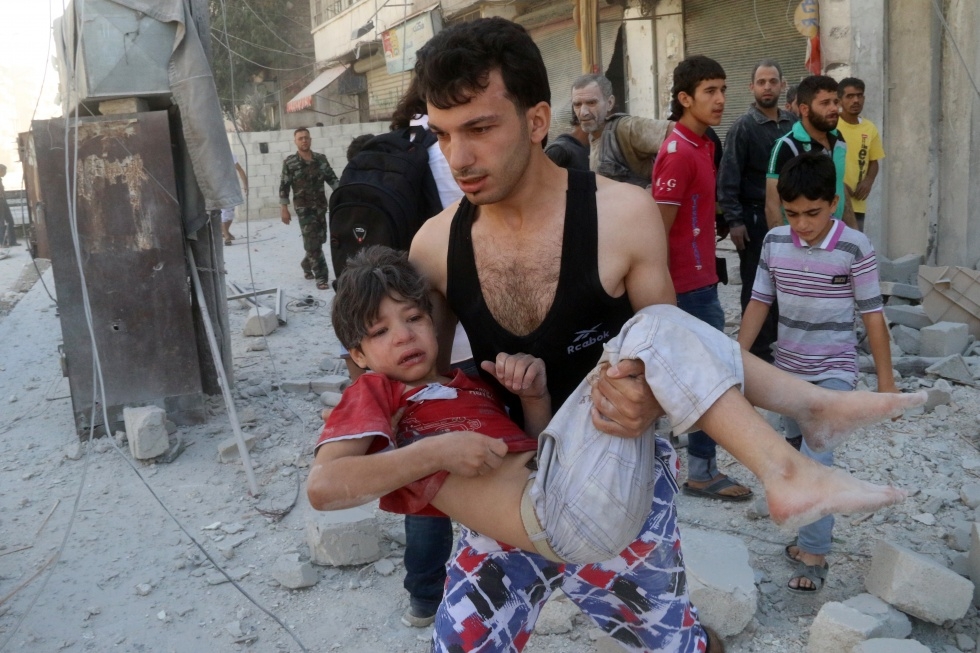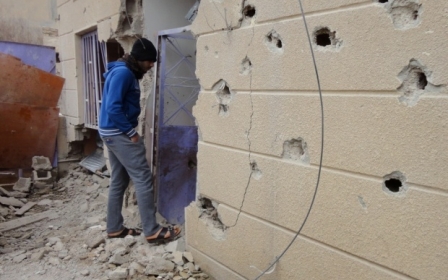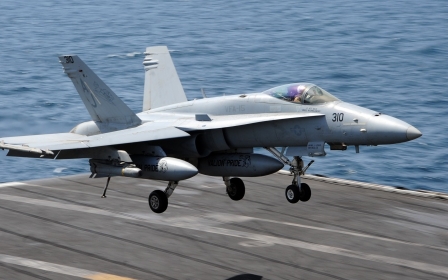Striking the Islamic State: A smaller misadventure in Iraq

More than a decade has passed, and the "war on terror" seems to have yielded the exact opposite of its objectives; more militancy, more chaos and less global security. President Obama won his first term on several platforms of change that he promised would bring - among many other things - pulling troops out of Iraq.
Bush's war on Iraq was launched for three main proclaimed reasons; destroying weapons of mass destruction - that were never found, simply because they never existed. Secondly; destroying Al-Qaeda - which the war created. Thirdly; democratisation - which lead to a sectarian regime, a divided Iraq and a military that disintegrated with the first confrontation, never mind 20 billion dollars were spent on the military. Bush's adventure has certainly had a disastrous effect on the region and has put its Arab allies at a geo-political disadvantage. Today Obama's goal is much more modest; simply to "degrade and ultimately destroy" the Islamic State (IS). While Obama's goal is less ambitious, it is actually more complicated than it may seem at first glance.
Obama's administration has certainly acknowledged the reality of today's world and US power; when he noted in West Point speech; "Invading every country that harbours terrorist networks is naive and unsustainable." It seems, however, that the developed alternative for tackling the IS is not different in attitude, and still focuses on the same methods.
Root causes still unaddressed
On more than one occasion, top US officials asserted that the desired outcome in Iraq cannot be attained exclusively with the use of lethal force; that a political solution is a must to settle matters in Iraq.
In a press briefing late August, Secretary of Defence, Chuck Hagel asserted: "Addressing the threat posed by ISIL to the future of Iraq requires political reform in Iraq." In the same briefing, General Martin Dempsey, chairman of the joint chiefs of staff said: "As Iraq's political future takes shape, I'd emphasise that enduring stability will depend on achieving a credible partner in the Iraqi government that must commit to being much more inclusive with all of its population than it has been thus far."
Obama was no different in his recent speech outlining his strategy to fight the IS. He made it clear that "American power can make a decisive difference, but we cannot do for Iraqis what they must do for themselves…that’s why I’ve insisted that additional US action depended upon Iraqis forming an inclusive government, which they have now done in recent days."
What should have been the most important aspect of Obama's speech and strategy was only given one sentence; that additional US action depended on an inclusive government which Iraq presumably achieved. Never mind that it is just too early to judge a government that has just formed, and not even complete; as the minister of defence and minister of interior still remain unnamed. Never mind that the government is mostly a re-shuffle of old faces in different and newly appointed positions.
Ironically, Bayan Jabr, previous commander of "the Badr Brigades," one of Iraq's most notorious death squads that killed and abused Sunni Iraqis arbitrarily, is still in the new government. Currently the minister of transport; he was previously minister of finance under al-Maliki and in the Iraqi transitional government, 2005-06, as minister of interior; a year that witnessed thousands of sectarian murders carried out by groups under Bayan's control as noted by John Pace, who was the United Nations human rights chief in Iraq.
One could dwell much more on the root causes of the internal conflict within Iraq, which involves marginalisation and wide scale grave human rights violations against Sunnis. Such oppression contributed to Iraq joining the Arab Spring, and having popular demands of reform, which have been overwhelmingly ignored in the media’s coverage of Iraq, as the IS takes the spotlight. The demands of hundreds of thousands of protestors were not honoured, but instead, they were met with bullets, prompting a full-blown Sunni rebellion as a last resort. Till this very moment, Sunnis are fighting the Iraqi central government.
Fighting the IS does not in any way address the root causes of the conflict in Iraq. This was noted by Amr Moussa, former secretary general of the Arab League on the side of a conference organised by the International Peace institute in Bahrain. He referred to the IS as "a bad reaction," and said, "If we defeat the IS today, without defeating the reasons of its rise; it will come back again in a year or two, and this is not a confrontational strategy. The current strategy is deficient and would not be effective."
Reactions in Syria
Revolutionaries in Syria have actually been quite appalled that despite hundreds of thousands of deaths caused by the Assad regime, no decisive action was taken against his forces nor genuine military support was given to the revolutionaries. Thus, head of the Free Syrian Army (FSA) has announced that the FSA is not interested in fighting the IS and that their efforts are primarily focused on bringing down the Assad regime. Similarly, the Muslim Brotherhood of Syria made an announcement that despite their condemnation of IS's extremism, they are not interested in participating in fighting against the IS, and may only reconsider if a more serious effort is produced to bring down Assad's regime.
This is perhaps why the US Congress has hastened to vote on the decision to authorise Obama to aid revolutionaries in Syria; an authorisation he did get. Still however, to expect that Syrian revolutionaries to turn their guns against the IS, which holds territory larger than the size of the UK and fights their main enemy - Assad is unrealistic. General Martin Dempsey has also caution that the Syrians receiving the assistance from the US may only be ready in a year.
Domestically in the US, Obama has had his fair share of criticism for his strategy, and policy makers and commentators fear that Obama is pulling the US into a slippery slope of more military engagement in Iraq as General Dempsey raised the possibility of deploying combat troops in Iraq. The criticism has also been directed at the overall strategy from senators from both the Democratic and Republican Parties, that the strategy is not comprehensive and short sighted.
Looking back at Bush's war on Iraq that was a huge failure with its consequences clearer today; it seems that the current strategy against IS will be a failure, but only on a smaller scale. It will not cost as much, and if any US troops are deployed, they won’t be many. If carried out in its current form, it will probably contribute to the exacerbation of instability in an already volatile region. It fails to genuinely address the underlying causes that feed the turmoil in Syria and Iraq and thus cannot be taken seriously.
-Mustafa Salama is a political analyst, consultant and freelance writer. Salama has extensive experience and an academic background in Middle East Affairs.
The views expressed in this article belong to the author and do not necessarily reflect the editorial policy of Middle East Eye.
Photo: A Syrian man carries a wounded child following a reported barrel bomb strike by government forces on a rebel-controlled district of the northern city of Aleppo on 19 September 19, 2014 (AFP).
New MEE newsletter: Jerusalem Dispatch
Sign up to get the latest insights and analysis on Israel-Palestine, alongside Turkey Unpacked and other MEE newsletters
Middle East Eye delivers independent and unrivalled coverage and analysis of the Middle East, North Africa and beyond. To learn more about republishing this content and the associated fees, please fill out this form. More about MEE can be found here.





